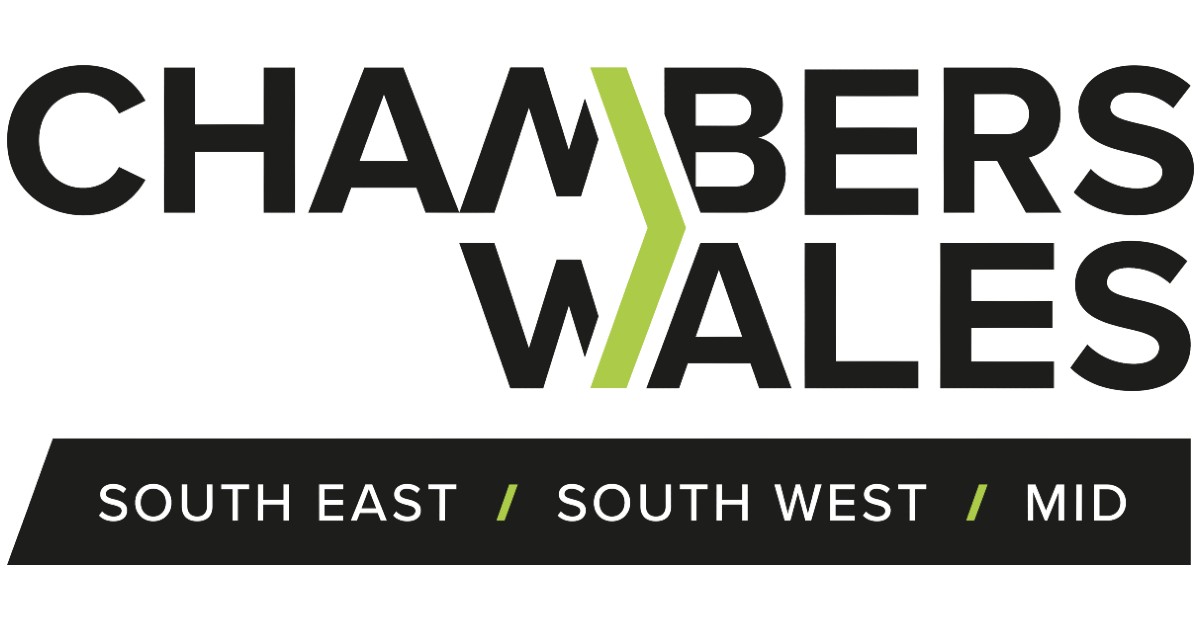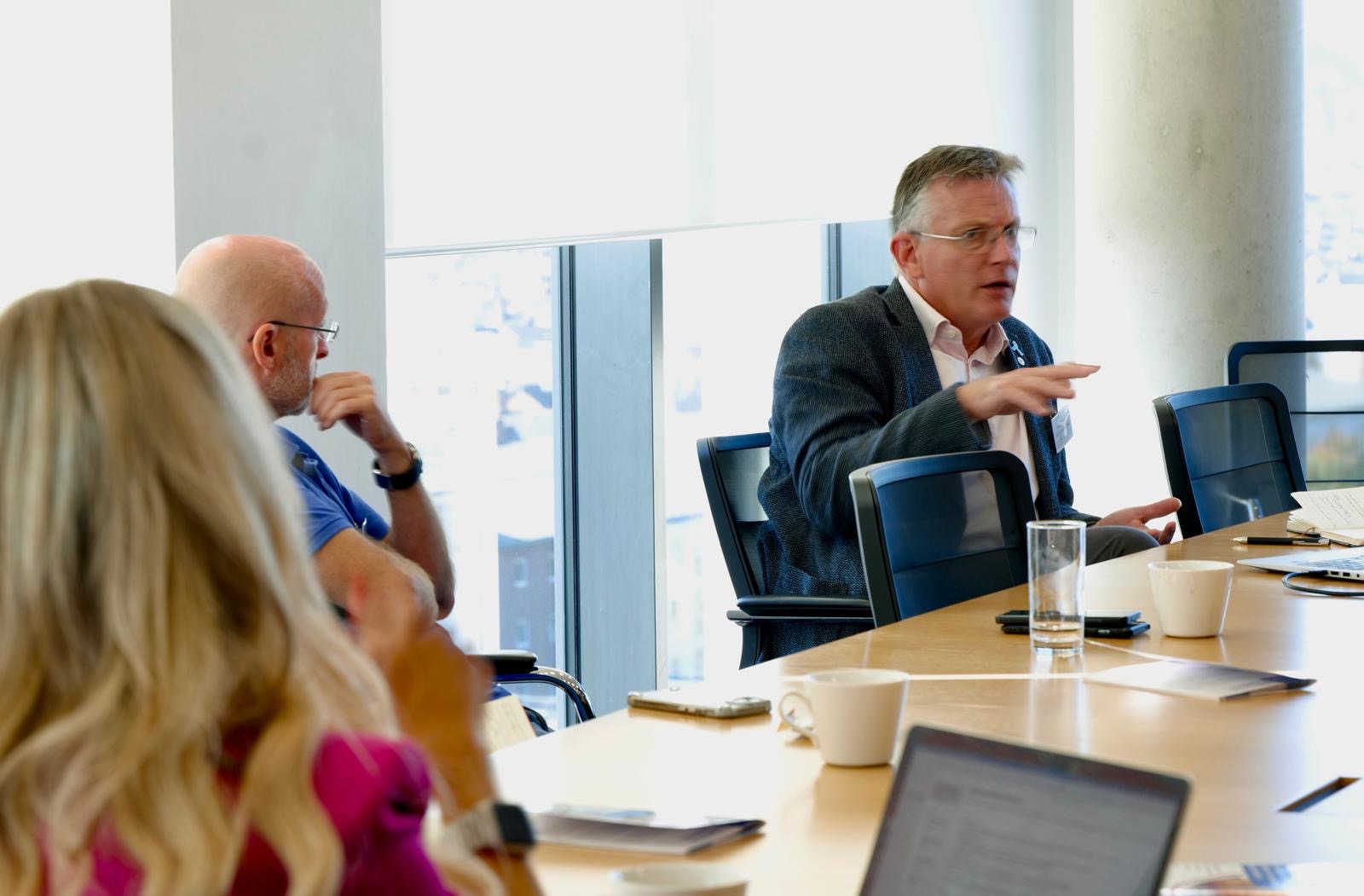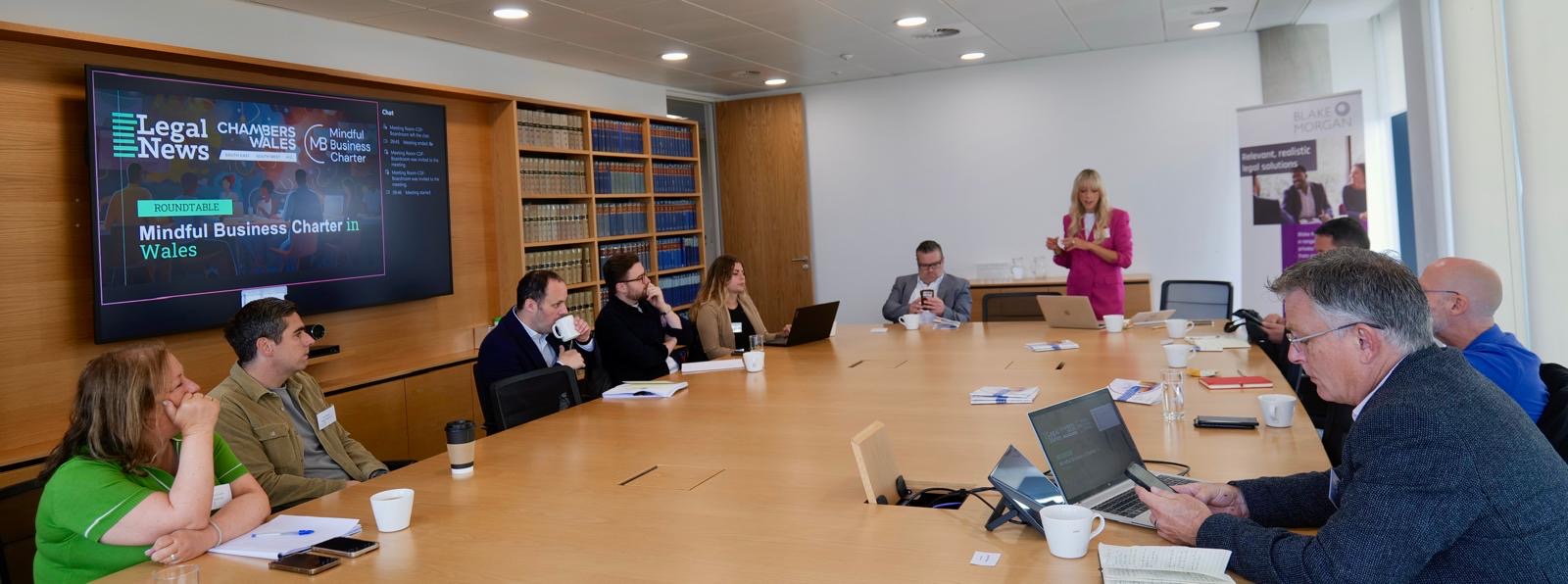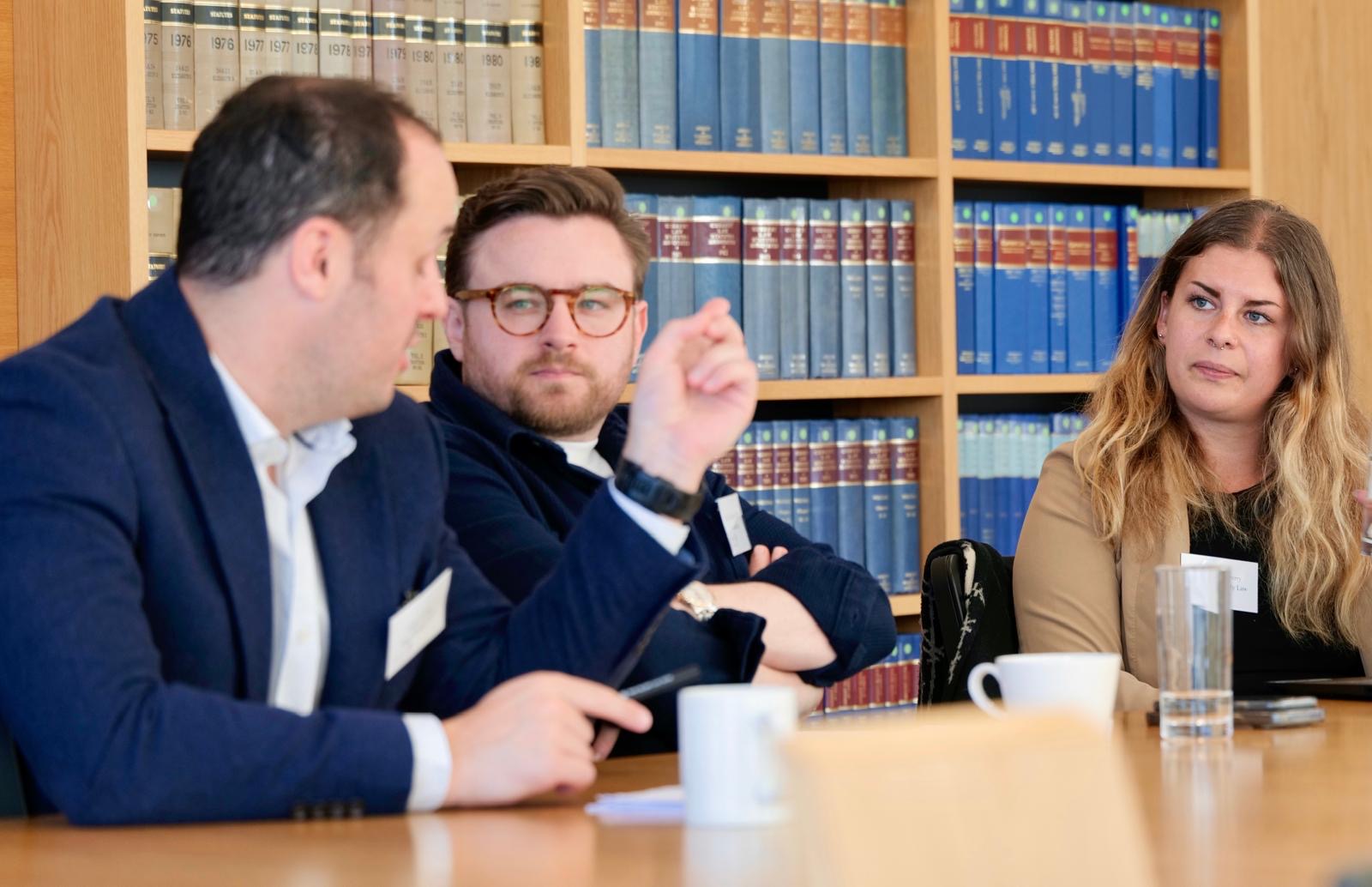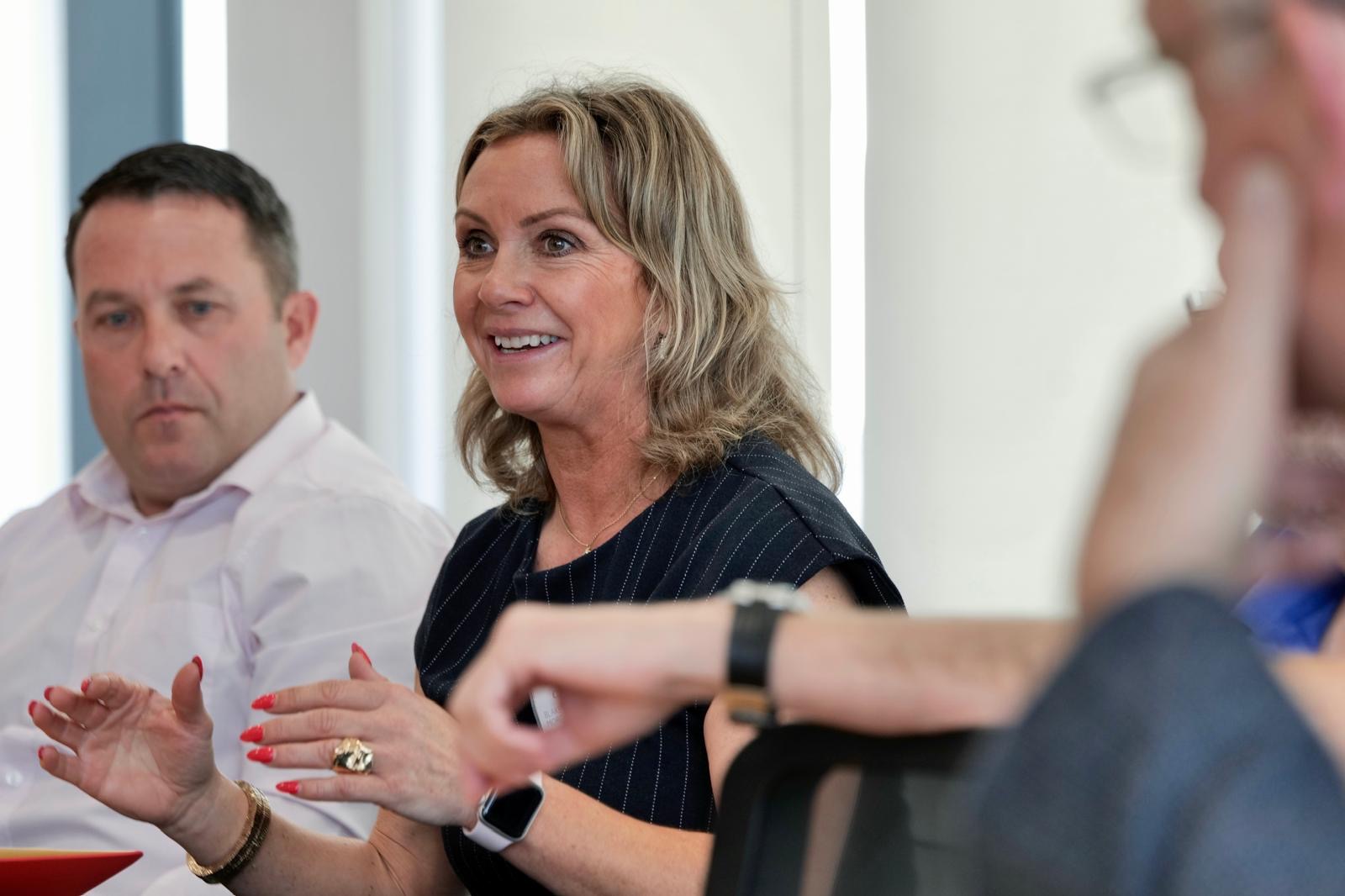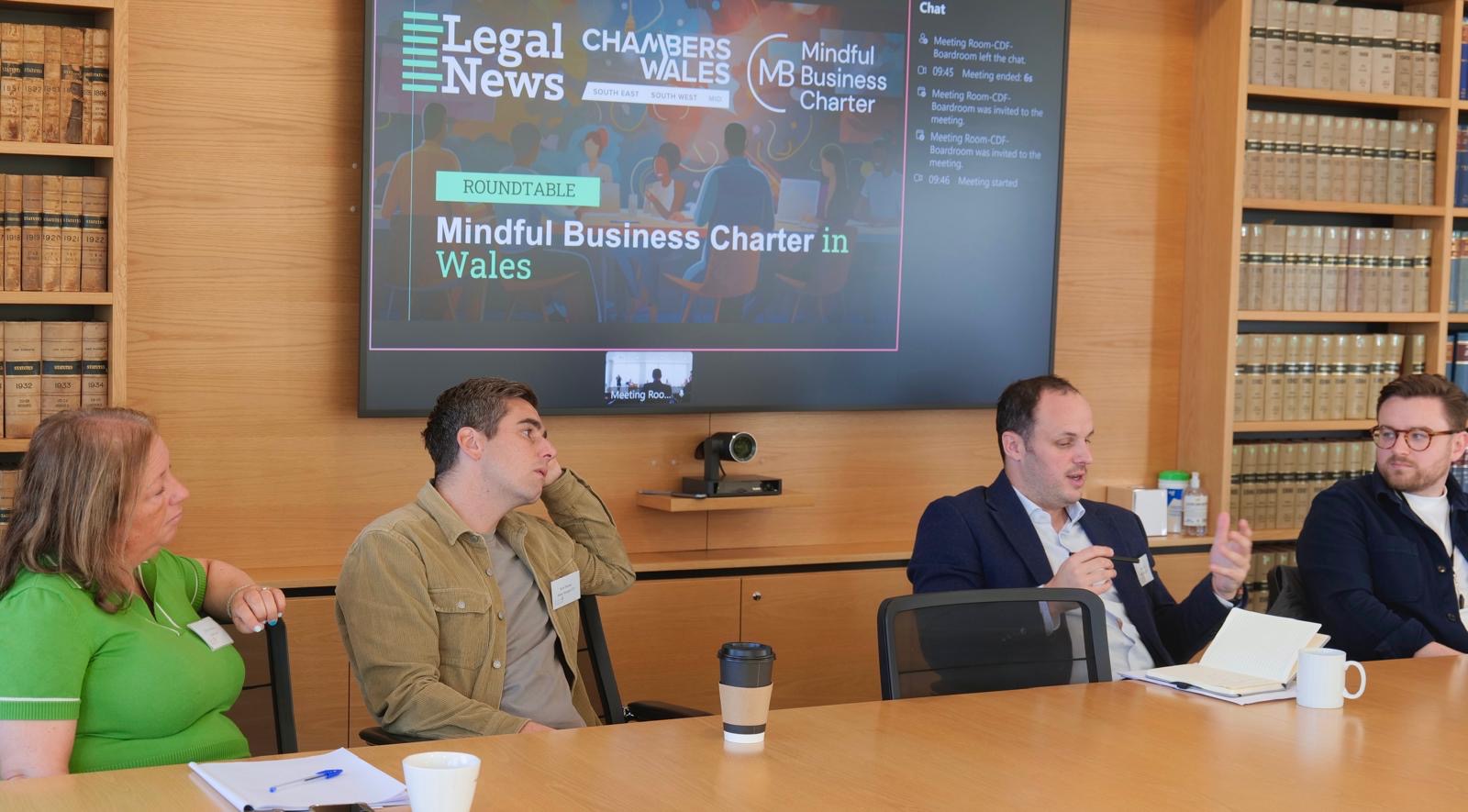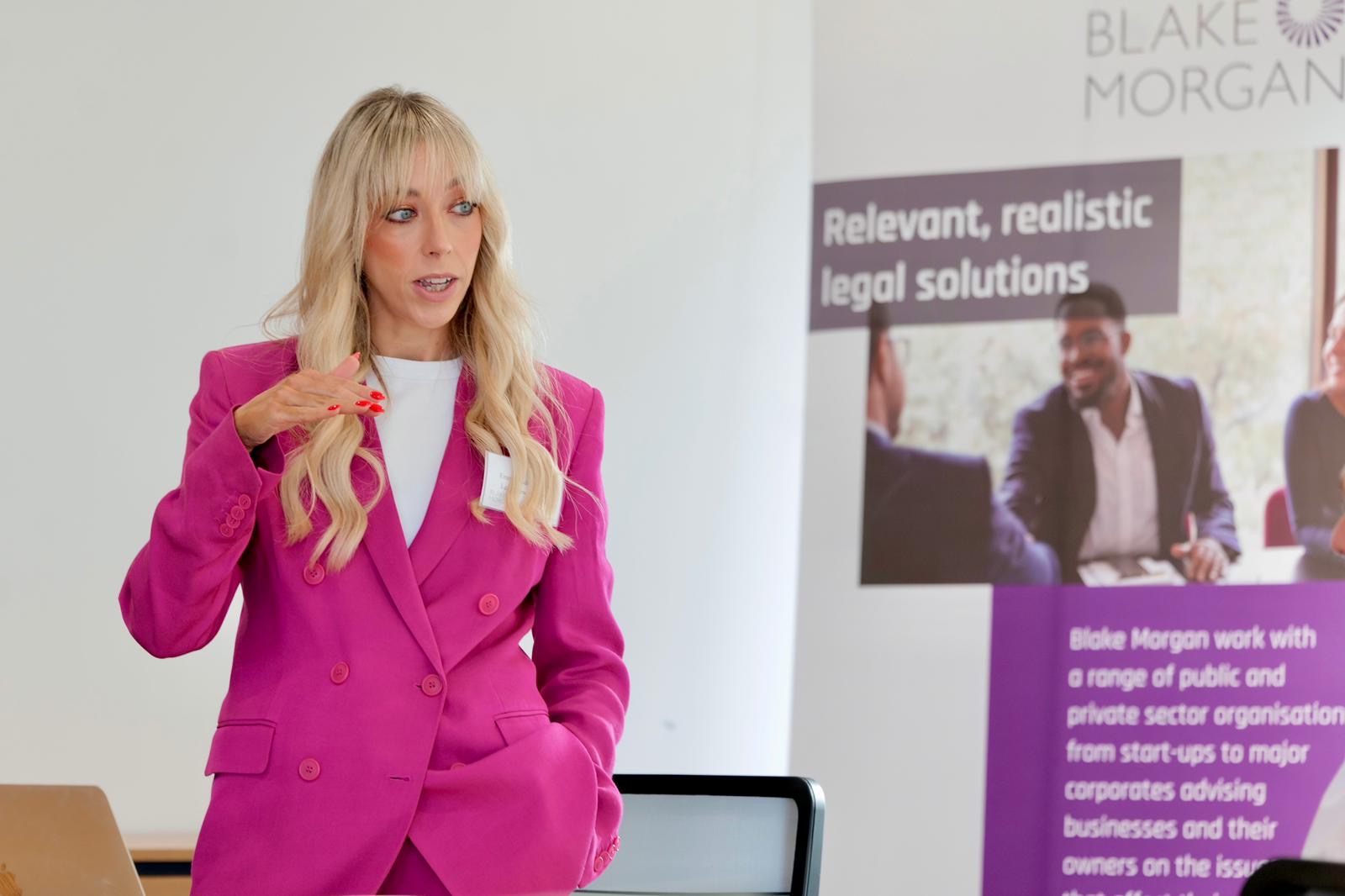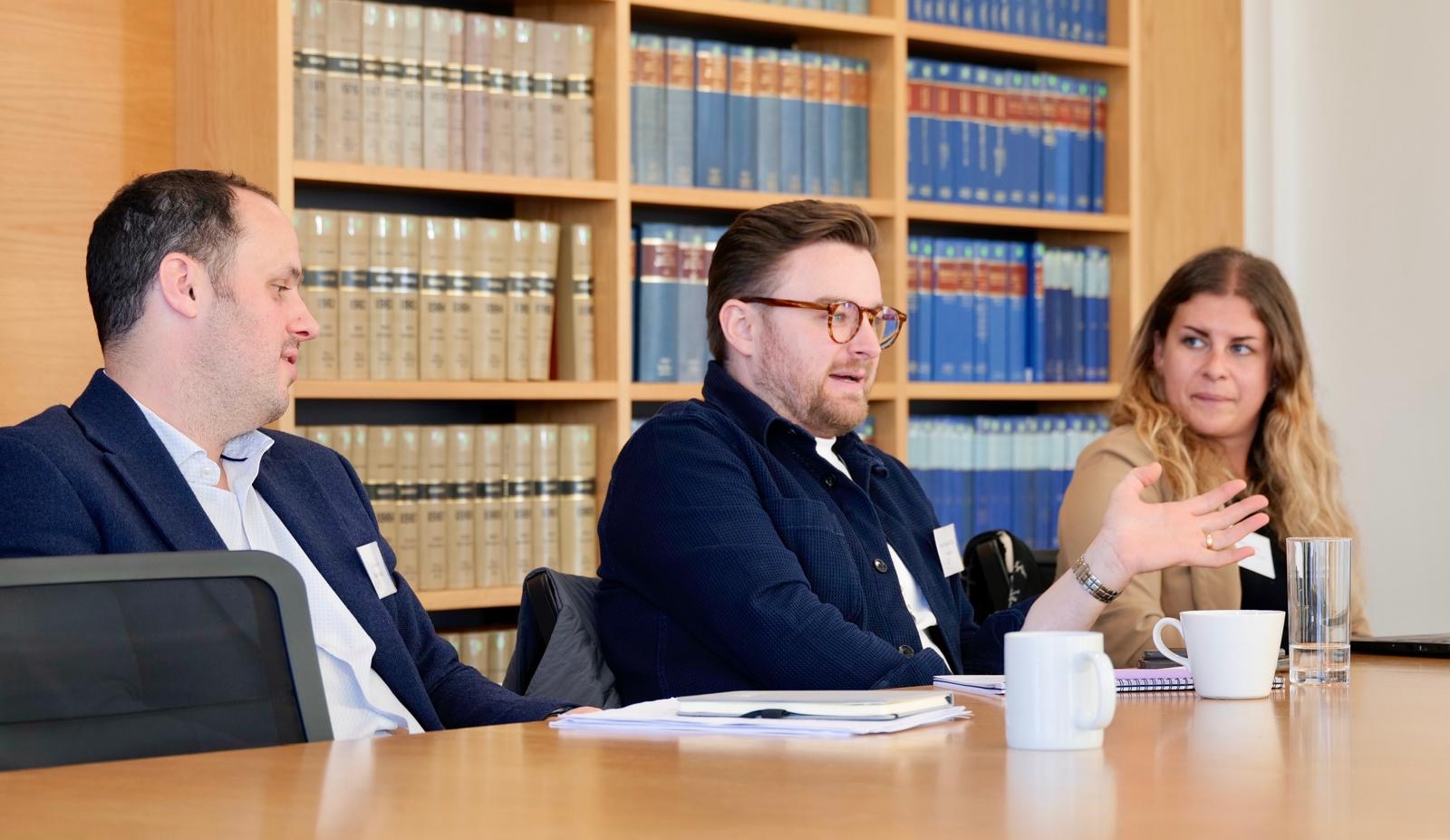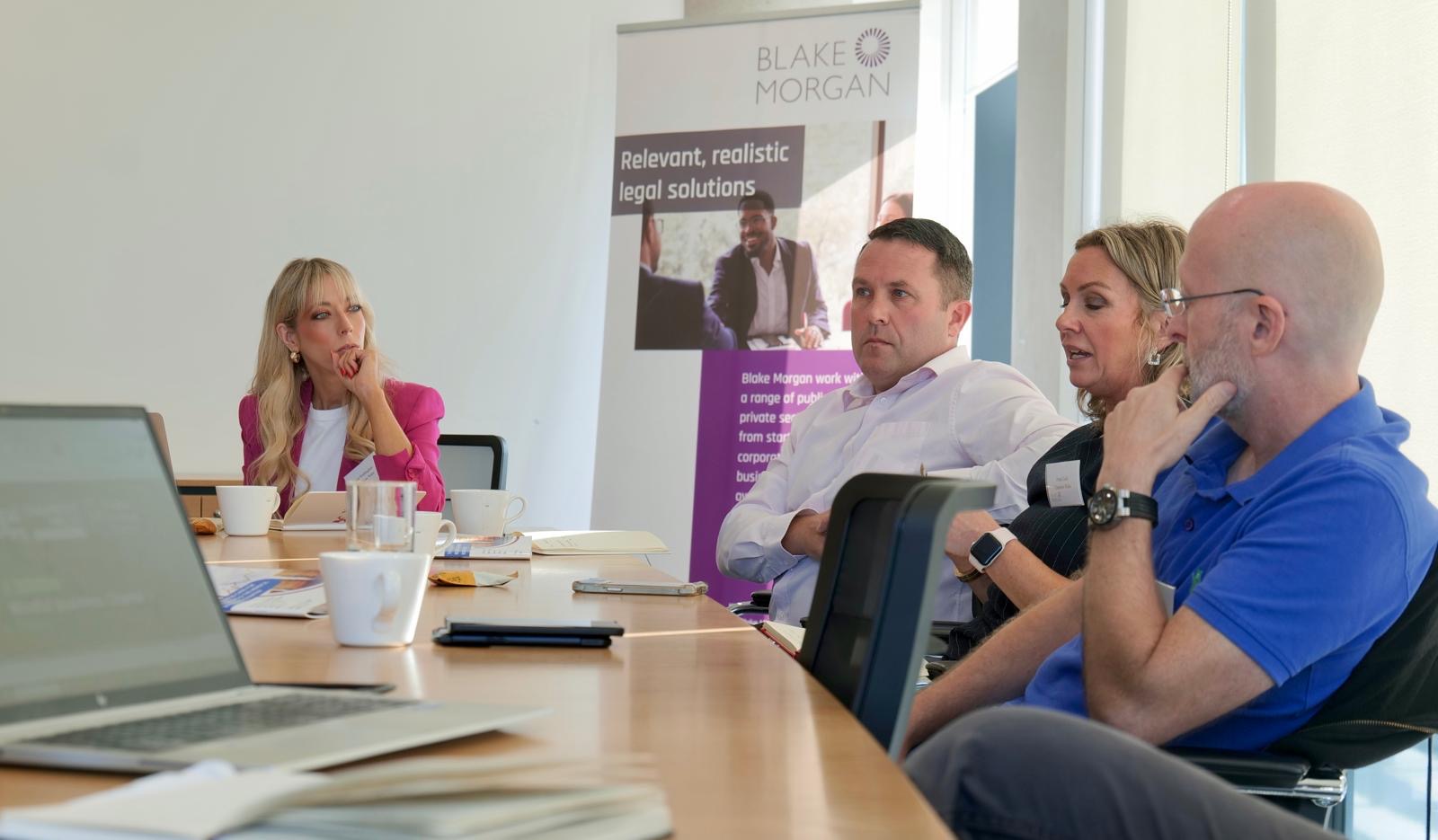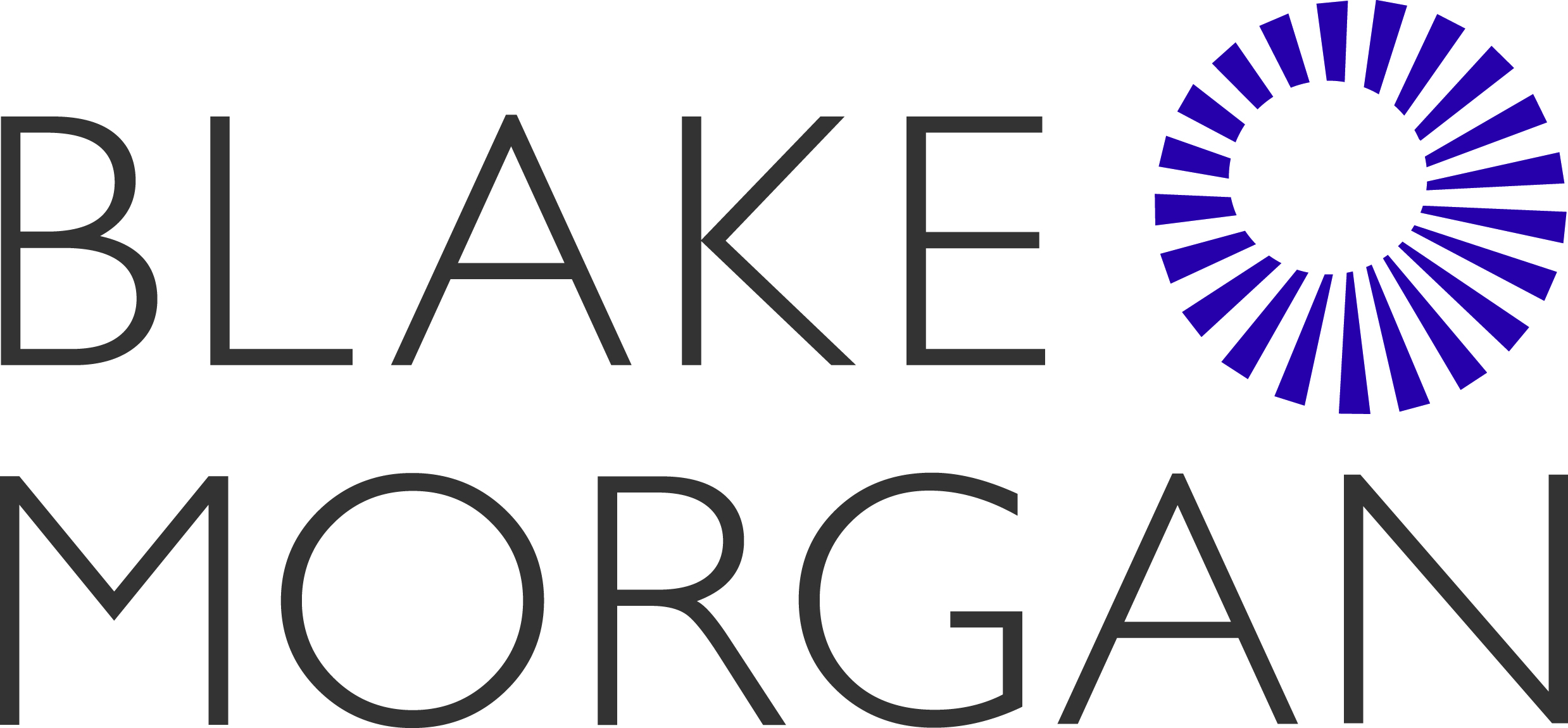Leaders from across the legal and professional services sector came together in Cardiff to take part in a roundtable on workplace wellbeing, sector pressures, and the role of the Mindful Business Charter (MBC) in creating healthier working cultures.
The event combined open discussion with an overview of the MBC from Richard Martin and a case study on its adoption at Blake Morgan, shared by Partner Tomos Lewis. It was hosted by Legal News Wales in partnership with Chambers Wales South East, South West and Mid on 30 September 2025 at Blake Morgan’s Wales office.
Sector pressures: billable hours, hybrid work and client demands
Participants agreed that the legal profession is facing a perfect storm of pressures: economic uncertainty, client expectations for immediacy, and the relentless weight of billable hours.
The “always on” culture was repeatedly cited as a major stressor, particularly as remote working has blurred boundaries between work and home. While flexibility is valued, many noted its hidden costs — from loneliness and lack of mentoring to the erosion of clear switching-off time.
Younger lawyers, many of whom entered the profession during COVID, have missed out on crucial in-person development. Without the informal “learning by osmosis” of office life, mistakes feel higher risk and support harder to access. The result: rising anxiety, a culture of perfectionism, and in some cases, juniors leaving the profession entirely.
Regulatory pressures also weighed heavily. Representatives working in professional discipline stressed the profound impact of lengthy investigations, which can leave solicitors sidelined for years regardless of eventual SRA Tribunal outcomes.
Leadership & culture: from policy to practice
The roundtable placed strong emphasis on the role of leadership in making wellbeing a lived reality. Attendees warned against “wellbeing washing” — for example, firms that utilise inconsistent wellbeing sessions or activities but fail to address systemic problems.
Instead, practical leadership behaviours were highlighted as the real differentiators:
- Transparency and openness: Senior lawyers admitting mistakes sets the tone for a supportive culture. It was also noted that firms often forget to communicate HOW to admit a mistake has been made, when and who to. It may well be in the policy or employee handbooks but often not communicated in a human, accessible way (such as supervisors inviting difficult conversations).
- Positive reinforcement: Recognising and valuing good work, not just pointing out errors, was seen as key to retention.
- Communication: A persistent issue and something everyone admitted law firms, and lawyers can get wrong. Many frustrations stemmed not from policies themselves, but from how changes were imposed — for example, sudden blanket mandates for hybrid / remote workers to return to the office.
- Supervision and training: Firms must invest in developing managers as leaders, not simply promoting strong billers. Several participants noted that supervision is too often treated as a compliance box-tick, rather than a responsibility to genuinely support junior colleagues.
One suggestion was to integrate wellbeing into performance management: holding managers accountable for how they treat their teams, not just financial metrics.
Practical solutions: small steps with big impact
A number of tangible initiatives were shared:
- Feedback loops: One firm introduced 360-degree reviews, allowing juniors to confidentially evaluate supervisors. Consistent concerns were taken into account in promotion decisions, creating incentives for positive management behaviour.
- Partner-trainee lunches: Regular informal conversations between senior and junior staff helped build trust and break down hierarchy.
- Discretionary rest days: Some firms encourage leaders to send staff home after particularly busy weeks, without needing to log annual leave. For example, if an individual is overreaching or hitting target week after week or long before their deadlines, reward them with a few days of paid leave rather than push them on to the end of the quarter.
- Client boundaries: Several participants stressed the importance of saying “no” when unreasonable demands threatened staff wellbeing, even at the risk of losing clients.
But the strongest consensus was that systemic change, not tokenistic perks, delivers results.
Research presented at the session showed that individual-focused wellbeing initiatives (mindfulness apps, resilience training) often have little measurable impact. Real improvement comes from tackling root causes: workload expectations, unclear boundaries, and poor management.
The Mindful Business Charter: prevention, not cure
Richard Martin introduced the origins and principles of the Mindful Business Charter, developed by Barclays and its panel firms to reduce avoidable stress in professional services.
The Charter is built around four pillars:
- Openness and Respect – encouraging candid conversations about the impact of behaviours.
- Smart Meetings & Communications – setting clear expectations and using the right platforms at the right time.
- Respecting Rest Periods – protecting evenings, weekends, and holidays where possible.
- Mindful Delegation – being clear on expectations, deadlines, and context when assigning work.
Importantly, the MBC encourages collaboration not only within firms but also with clients, challenging the assumption that availability equals quality.
Blake Morgan’s MCB experience
As part of the discussion, Tomos Lewis explained why Blake Morgan adopted the Charter: a chance to reflect honestly on existing practices, identify gaps, and strengthen its culture of wellbeing.
The firm’s approach has included:
- Self-assessment: Holding up the Charter “as a mirror” to evaluate strengths and weaknesses.
- Embedding in culture: Using MBC principles to guide supervision and leadership training.
- Collaboration: Sharing ideas and challenges with other signatory firms through monthly forums.
- Practical tools: For example, adopting the “NANO” principle for meetings (Necessary attendees, Agenda, Notice, Objective).
Tomos noted that while the Charter is not a silver bullet, it provides a valuable framework and a shared language to challenge unhealthy norms:
“It’s easy to think you’re doing the right thing…but having something to ground yourself in makes all the difference.”
Looking ahead: systemic change and collaboration
When asked what systemic changes they wanted to see across the sector, attendees called for:
- Recognition of non-chargeable contributions (such as business development or pro bono) as valuable.
- A shift in promotion criteria to reward good management, not just technical or financial performance.
- Clearer SRA accountability for workplace cultures that cause harm.
- Sector-wide collaboration, learning from peers rather than treating wellbeing as a competitive advantage.
Ultimately, the roundtable reinforced that the profession is still some way from being an environment participants would actively encourage their children to enter. But events like this — open, honest, and collaborative — were seen as vital signals of change.
The last word
The Mindful Business Charter roundtable highlighted a shared determination to move beyond posters and platitudes, towards structural change in how professional services manage workload, client expectations, and culture.
As one participant reflected, the goal is simple: to create workplaces where mistakes are survivable, people feel valued, and success is not measured solely in six-minute units.
Legal News Wales and Chambers Wales thank all contributors for their openness and commitment to raising the bar on wellbeing across the sector.
Resilient Leaders
Legal News Wales and Chambers Wales will be hosting further Resilient Leaders events. To stay in the know, click here to subscribe for more information and an invite to our next events.
Your next steps
For helpful information and support from the Mindful Business Charter, including its Legal Sector Guidelines, recent White Paper, and the Charter visit the MBC Resources page.
To contact Chambers Wales South East, South West and Mid about its events, roundtables, representation and network benefits, contact Penny Lock, Director of Partnerships: penny.lock@cw-seswm.com or visit cw-seswm.com
Hosted in partnership by:

